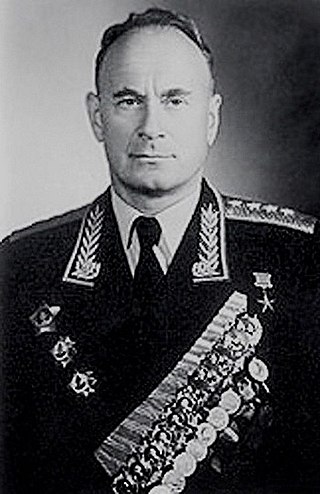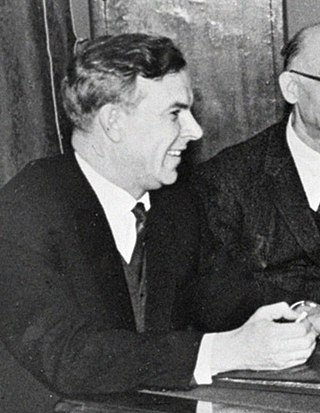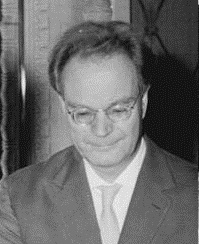| |||||
| Decades: | |||||
|---|---|---|---|---|---|
| See also: | |||||
The following lists events that happened during 1961 in the Union of Soviet Socialist Republics .
| |||||
| Decades: | |||||
|---|---|---|---|---|---|
| See also: | |||||
The following lists events that happened during 1961 in the Union of Soviet Socialist Republics .

Nikita Sergeyevich Khrushchev was First Secretary of the Communist Party of the Soviet Union from 1953 to 1964, and Chairman of the Council of Ministers (premier) from 1958 to 1964. During his rule, Khrushchev stunned the communist world with his denunciation of his predecessor Joseph Stalin's crimes and embarked on a policy of de-Stalinization with his key ally Anastas Mikoyan. He sponsored the early Soviet space program and the enactment of moderate reforms in domestic policy. After some false starts, and a narrowly avoided nuclear war over Cuba, he conducted successful negotiations with the United States to reduce Cold War tensions. In 1964, the Kremlin leadership stripped him of power, replacing him with Leonid Brezhnev as First Secretary and Alexei Kosygin as Premier.

The Kitchen Debate was a series of impromptu exchanges through interpreters between U.S. Vice President Richard Nixon and Chairman of the Council of Ministers Nikita Khrushchev, at the opening of the American National Exhibition at Sokolniki Park in Moscow on July 24, 1959.

Alexander Nikolayevich Shelepin was a Soviet politician and intelligence officer. A long-time member of the Central Committee of the Communist Party of the Soviet Union, he served as First Deputy Prime Minister, as a full member of the Politburo and as the chairman of the KGB from December 1958 to November 1961. He continued to maintain decisive influence in the KGB until 1967; his successor as chairman of the KGB, Vladimir Semichastny, was his client and protégé.

Ivan Alexandrovich Serov was a Soviet intelligence officer who served as Chairman of the KGB from March 1954 to December 1958 and Director of the GRU from December 1958 to February 1963. Serov was NKVD Commissar of the Ukrainian SSR from 1939 to 1941 and Deputy Commissar of the NKVD under Lavrentiy Beria from 1941 to 1954.

Vladimir Yefimovich Semichastny was a Soviet politician, who served as Chairman of the KGB from November 1961 to May 1967. A protégé of Alexander Shelepin, he rose through the ranks of the Communist Youth League (Komsomol).

Maksim Zakharovich Saburov was a Soviet engineer, economist and politician, three-time Chairman of Gosplan and later First Deputy Premier of the Soviet Union. He was involved in the Anti-Party Group's attempt to displace Nikita Khrushchev in 1957.

Mikhail Georgiyevich Pervukhin was a Soviet official during the Stalin Era and Khrushchev Era. He served as a First Deputy Chairman of the Council of Ministers, literally First Vice-Premier of the Soviet Union, from 1955 to 1957.

Georgy Maximilianovich Malenkov was a Soviet politician who briefly succeeded Joseph Stalin as the leader of the Soviet Union. However, at the insistence of the rest of the Presidium, he relinquished control over the party apparatus in exchange for remaining Premier and first among equals within the Soviet collective leadership. He then became embroiled in a power struggle with Nikita Khrushchev that culminated in his removal from the premiership in 1955 as well as the Presidium in 1957.

Nikolai Alexandrovich Bulganin was the Premier of the Soviet Union from 1955 to 1958. He also served as Minister of Defense, following service in the Red Army during World War II.
On the Cult of Personality and Its Consequences, popularly known as the Secret Speech, was a report by Soviet leader Nikita Khrushchev, First Secretary of the Communist Party of the Soviet Union, made to the 20th Congress of the Communist Party of the Soviet Union on 25 February 1956. Khrushchev's speech was sharply critical of the rule of the deceased General Secretary and Premier Joseph Stalin, particularly with respect to the purges which had especially marked the last years of the 1930s. Khrushchev charged Stalin with having fostered a leadership cult of personality despite ostensibly maintaining support for the ideals of communism. The speech was leaked to the West by the Israeli intelligence agency Shin Bet, which received it from the Polish-Jewish journalist Wiktor Grajewski.
De-Stalinization comprised a series of political reforms in the Soviet Union after the death of long-time leader Joseph Stalin in 1953, and the thaw brought about by ascension of Nikita Khrushchev to power, and his 1956 secret speech "On the Cult of Personality and Its Consequences", which denounced Stalin's cult of personality and the Stalinist political system.
The following lists events that happened during 1959 in the Union of Soviet Socialist Republics.
The following lists events that happened during 1953 in the Union of Soviet Socialist Republics.
The following lists events that happened during 1954 in the Union of Soviet Socialist Republics.
The following lists events that happened during 1955 in the Union of Soviet Socialist Republics.
The following lists events that happened during 1956 in the Union of Soviet Socialist Republics.
The following lists events that happened during 1957 in the Union of Soviet Socialist Republics.
The following lists events that happened during 1958 in the Union of Soviet Socialist Republics.
The following lists events that happened during 1962 in the Union of Soviet Socialist Republics.
The following lists events that happened during 1971 in the Union of Soviet Socialist Republics.